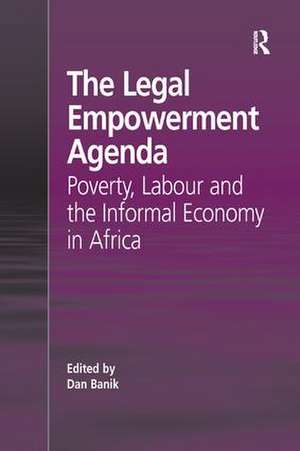The Legal Empowerment Agenda: Poverty, Labour and the Informal Economy in Africa
Editat de Dan Baniken Limba Engleză Paperback – 19 mai 2011
Preț: 470.32 lei
Nou
Puncte Express: 705
Preț estimativ în valută:
90.02€ • 92.77$ • 75.100£
90.02€ • 92.77$ • 75.100£
Carte tipărită la comandă
Livrare economică 01-15 martie
Preluare comenzi: 021 569.72.76
Specificații
ISBN-13: 9781409411192
ISBN-10: 1409411192
Pagini: 242
Dimensiuni: 156 x 234 x 13 mm
Greutate: 0.48 kg
Ediția:1
Editura: Taylor & Francis
Colecția Routledge
Locul publicării:Oxford, United Kingdom
ISBN-10: 1409411192
Pagini: 242
Dimensiuni: 156 x 234 x 13 mm
Greutate: 0.48 kg
Ediția:1
Editura: Taylor & Francis
Colecția Routledge
Locul publicării:Oxford, United Kingdom
Cuprins
Contents: Introduction, Dan Banik; Towards an effective regulatory framework for labour rights and social protection in southern Africa, Evance Kalula, Ngozi Okorafor and Pamhidzai Bamu; Poverty, legal empowerment and informal business in South Africa, Marlese von Broembsen; Waste management and the workplace, Jan Theron and Margareet Visser; Formalising trading spaces and places: an analysis of the informal sector in Lusaka, Zambia, Wilma Sichombo Nchito; The complexities and paradoxes of governing the informal sector in Malawi: the case of street vending in Zomba and Blantyre, Blessings Chinsinga and Happy Kayuni; The informal health industry in East Africa and implementation of the legal empowerment of the poor agenda in developing countries, Kanakulya Dickson; Human rights of the working poor in Uganda's informal sector, Lilian Keene-Mugerwa; Informal labour and the ethic of care: legal protection of care-givers in Malawi, Ngeyi Ruth Kanyongolo; The right to water: an inquiry into legal empowerment and property rights formation in Tanzania, Ellen Hillbom; Rights, legal empowerment and the informal economy in Africa: concluding remarks, Dan Banik; Index.
Notă biografică
Dan Banik is an Associate Professor of Development Studies at the University of Oslo, Norway.
Recenzii
'While not intentionally polemic, this is a rich and eclectic collection of case studies that focuses on labour and problematizes CLEP’s bias toward formalization of economic relations. Several chapters in this volume show that the unintended consequence of greater formalization may be increased marginalization of the intended beneficiaries. The sum of these case studies cautions against an ideological one size fits all approach to formalization of economies and implicitly recognizes that law and its implementation is the reflection of contested policy choices. If that is true, the law can never work for everyone. But this collection of case studies provides valuable insights into how the law might transit from working for a few to working for some, and then working for many. This volume is a must read for those who take equity in development seriously.' Erik Jensen, Stanford University, USA 'Drawing on a rich base of empirical data from countries in eastern and southern Africa, the authors of this volume make a valuable contribution to our understanding of the challenges associated with empowering the poor in the informal sector. The book calls into question the value of handling the issues from above and shows the importance of contextual variables and local variation. For instance, several authors demonstrate the limitations inherent in Hernando de Soto´s approach to formalizing the informal, that has worked in some Latin American countries but which runs into difficulties in the less industrialized African countries. It is an important book and should be read by academics and policy practitioners alike.' Goran Hyden, University of Florida, USA
Descriere
Defined as a process which increases access to justice and the legal rights of the poor, 'legal empowerment' is increasingly being considered to be an important tool in anti-poverty efforts in developing countries. This volume discusses the opportunities and constraints related to the enhancement of legal empowerment in the informal economy, with a focus on labour and business rights in Africa.








